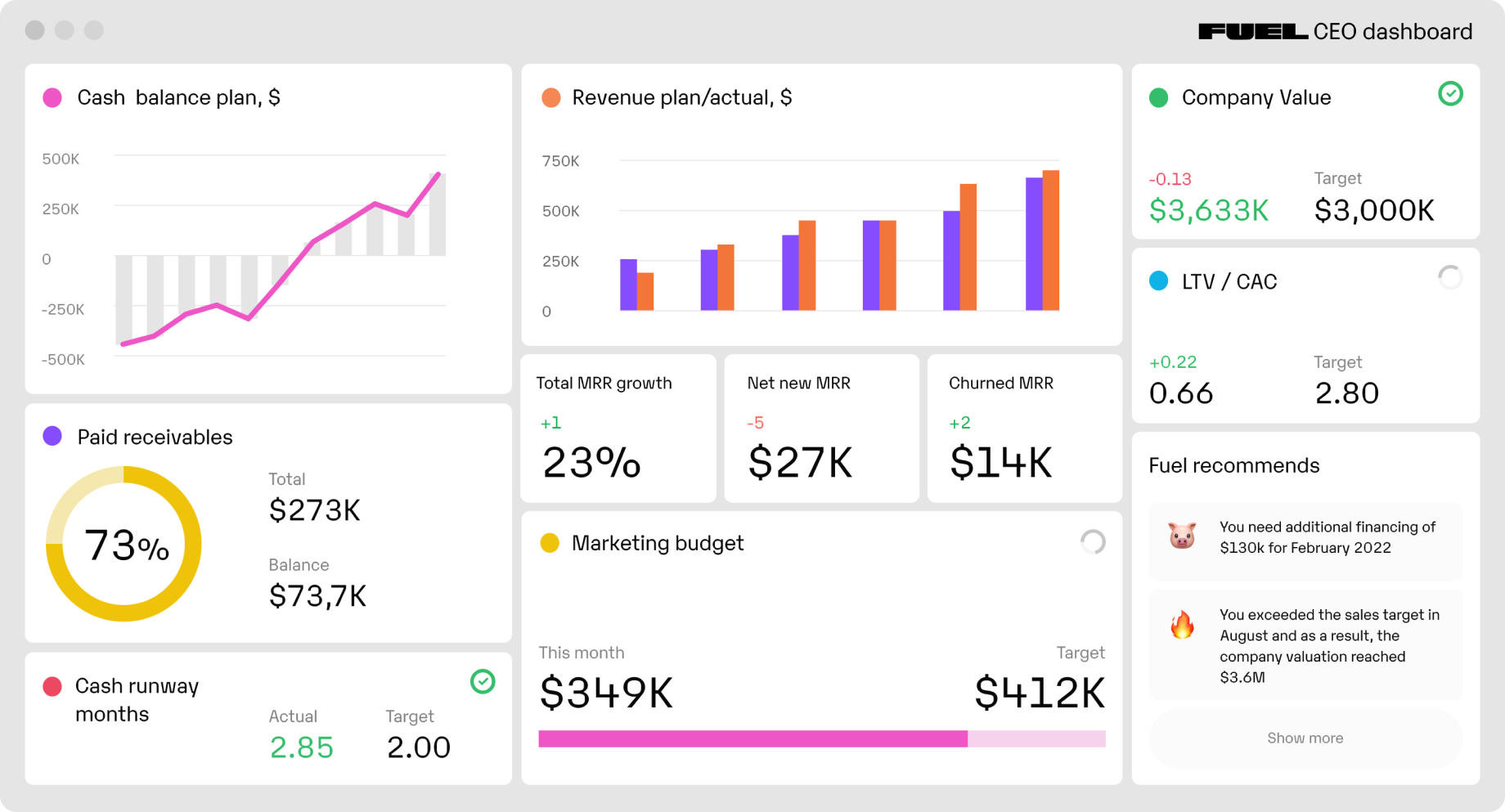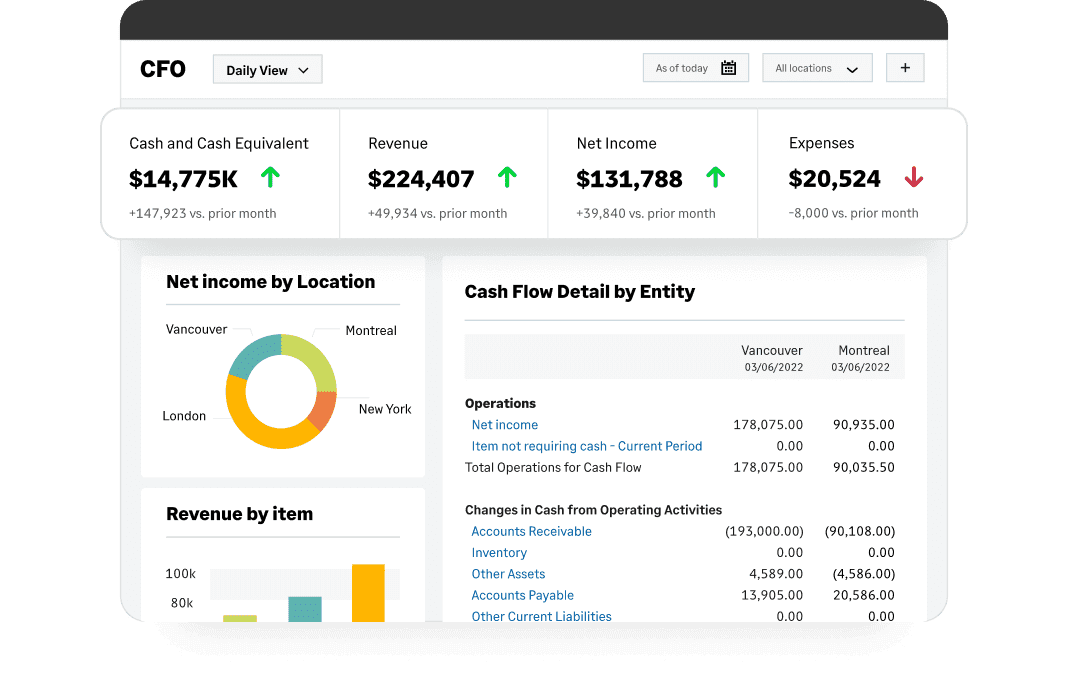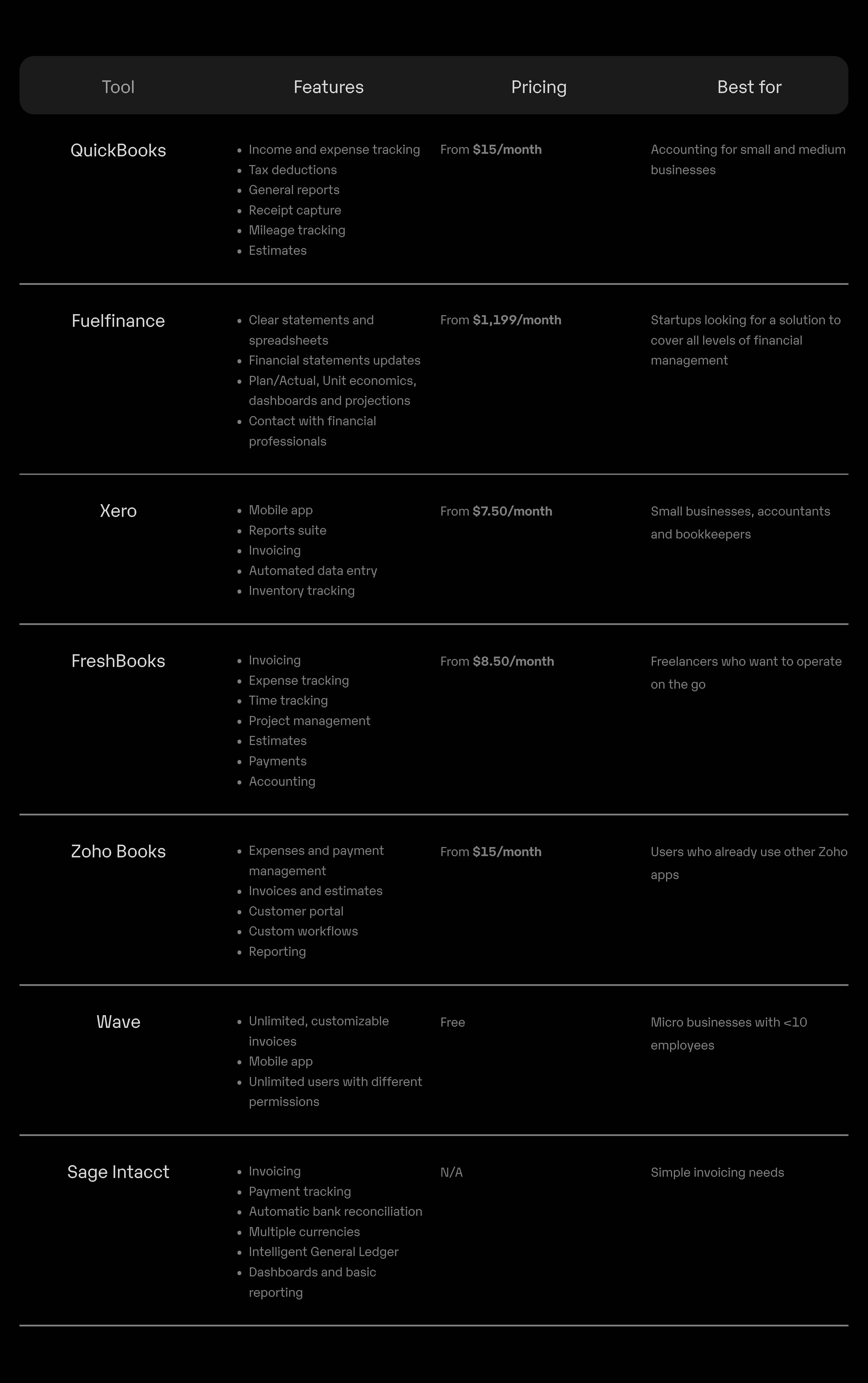


Wondering what financial management can do for you? Efficient financial management helped Astra International improve its YoY profit by 31%, while the Turner Construction Company recorded a 10% increase in revenue and a 26% increase in net profit. Investing in the right tools can help you achieve similar results.
QuickBooks is accounting software for tracking expenses and income in small businesses. It organizes your financial information, eliminating much of the manual data entry and sorting work.
However, QuickBooks has limited financial insights, and there are similar tools worth exploring. Whether you want to keep using QuickBooks but are looking for an addition or want to replace it, our article can help you. Keep reading to explore the best QuickBooks alternatives for small businesses that give you the same results – or more.
The first place on our list is not a direct alternative to QuickBooks, but it's the best solution for complex financial management. Fuelfinance integrates with QuickBooks to give you in-depth financial reports based on the data collected from the program. We can become your fractional CFO, eliminating the need to hire an in-house expert. That’s because Fuelfinance is the combination of financial analysis software and people – a startup accountant and financial manager, to be exact.
At Fuelfinance, we have experience managing over $250 million for clients like Reface, Dressx, Alleyoop, Netevia and Lemon.io. Here are some results from our case studies to help you see what you can gain:

With our financial modeling software, you can save up to 90% of the cost of hiring a person or team to handle your spreadsheets. The most affordable plan is with Quarterly payments:
We also offer ad-hoc help from experts in your niche at a sane, transparent hourly rate. Contact us to stop worrying about your cash flow.
Fuelfinance has a 4.9/5-star rating based on 160 reviews on Product Hunt.
Xero is a fully functional accounting software and one of the biggest QuickBooks online competitors. It's one of the most affordable options on our list, with unlimited users and inventory management in each plan. Customers enjoy its intuitive user interface and setup.
Unfortunately, no live chat support or phone number is available to contact a specialist. No industry-specific reports are available. Users with multiple businesses must pay for separate subscriptions.

Image source: Capterra
Xero is most affordable when paying for three months in advance, with 50% off the usual price and free support. Here's the discounted pricing plan:
Xero has a rating of 4.4/5 stars with 2.8k reviews on Capterra.
For more information, see how Xero compares to QuickBooks.
FreshBooks is small business accounting software tailored towards freelancers, independent contractors and self-employed professionals. All their plans come with a client self-service portal, estimates, invoices, time tracking and expense tracking. There are also options for mobile mileage tracking, basic inventory tracking and live phone support.

Image source: Forbes
A dedicated account manager is only available with the most expensive Select plan.
FreshBooks has four pricing plans:
With annual billing, you get an additional 10% off.
FreshBooks has a rating of 4.5/5 stars based on 670 reviews on G2.
This program is part of the Zoho suite of business applications, which include Zoho CRM for customer relationship management or Zoho Projects for project management. Books has valuable accounting features for small companies.
Zoho Books takes a long time to update changes issued by financial institutions. Its customer service is slow, and some clients complain that the program isn’t the best option for small business owners who want to scale and automate their operations.

Image source: CPA Practice Advisor
This QuickBooks alternative for small businesses has a free option for small companies with yearly revenue of up to $50k and 1,000 invoices. Zoho Books also has paid plans for bigger needs:
Zoho Books has a rating of 4.4/5 stars with a little over 600 reviews on Capterra.
Wave Accounting is the only free QuickBooks alternative. It's easy to operate, with unlimited users, invoicing, income and expense tracking and bank and credit card connections. The bookkeeping and banking tools work together or separately.
However, you don't get access to some of the more advanced features other alternatives to QuickBooks offer, such as third-party integrations or project profitability. Live customer support is only available with one of the paid Wave add-ons.

Image source: Software Advice
Wave doesn't have third-party integrations (it only integrates with in-house apps) or higher-tier plans with advanced features. There's no inventory management option and much fewer reporting options than its competitors.
The basic Wave accounting tools and invoicing features are 100% free, but you have to pay for additional options, which include:
Wave has a rating of 4.5/5 stars with almost 1,500 reviews on Capterra.
Sage Intacct is cloud-based accounting software for financial management. It works well for both growing startups and large, established companies. There are no time- or project-tracking tools, automated workflows or advanced analytics. However, it's a solid, inexpensive option for creating and sending invoices and payment tracking.

Image source: Software Advice
There are no pricing details available on the Sage Intacct official website.
Sage Intacct has a rating of 4.2/5 stars with a little over 400 reviews on GetApp.
The feature set you choose depends on your unique business needs (like a multi-currency option, project management or time tracking). Here are some aspects to look out for:
We advise opting for a scalable solution that can grow with your company. A solid financial management solution helps you plan and acquire funds, effectively use your budget and improve your overall profitability and value.
Free accounting software options sound tempting, and they may prove valuable – to an extent, and usually only until you start gaining momentum. The key is to balance features with cost. For example, Fuelfinance is the most expensive option on this list, but it can save you thousands on annual spending for an accountant or a whole team of experts.
We also considered customer satisfaction levels for each tool on our list. They give you an insight into how satisfied other users are with the product.
Integrations facilitate free data flow between your applications and reduce the need for manual data entry. They save time, minimize the risk of human error, improve accuracy and prevent redundancy. Look for integrations with tools you're already using, such as:
See also: 5 best QuickBooks integrations for financial management
Here is an overview of all the tools mentioned in the article, from QuickBooks and its alternatives to an additional option Fuelfinance.

The best QuickBooks alternative for a small business should help you simplify taxes, improve your financial well-being and help you become free and confident in your business ventures.
However, if you're happy with the QuickBooks invoicing software and want to give your business a boost with spreadsheets, graphs and automation, Fuelfinance is the option for you. It combines proprietary FP&A software and a team of financial professionals to help you save hours on organizing data and making wiser, data-driven decisions.
Sign up to boost your revenue and cut expenses.
Some popular accounting software solutions that can work as QuickBooks alternatives for small businesses include Xero, FreshBooks, Zoho Books, Wave and Sage Intacct. If you want a solution that gives you actionable insights from your QuickBooks data and can even act as your outsourced CFO, opt for Fuelfinance.
Yes, most accounting software on our list has similar functionalities to QuickBooks, such as invoicing, accounting or income and expense tracking.
Microsoft Excel is good for basic bookkeeping, but it has limited options in terms of automation, efficiency, complex tasks and large data volumes. Specialized accounting solution offers features like automatic bank feeds, financial reporting and integration with tax preparation software, which can save time and reduce the chance of errors.
Yes, you can do bookkeeping without any specialized accounting software products. However, manual bookkeeping isn’t as effective or fast.


Just imagine how that would transform your team’s productivity and focus? Talk to our financial experts to know more.